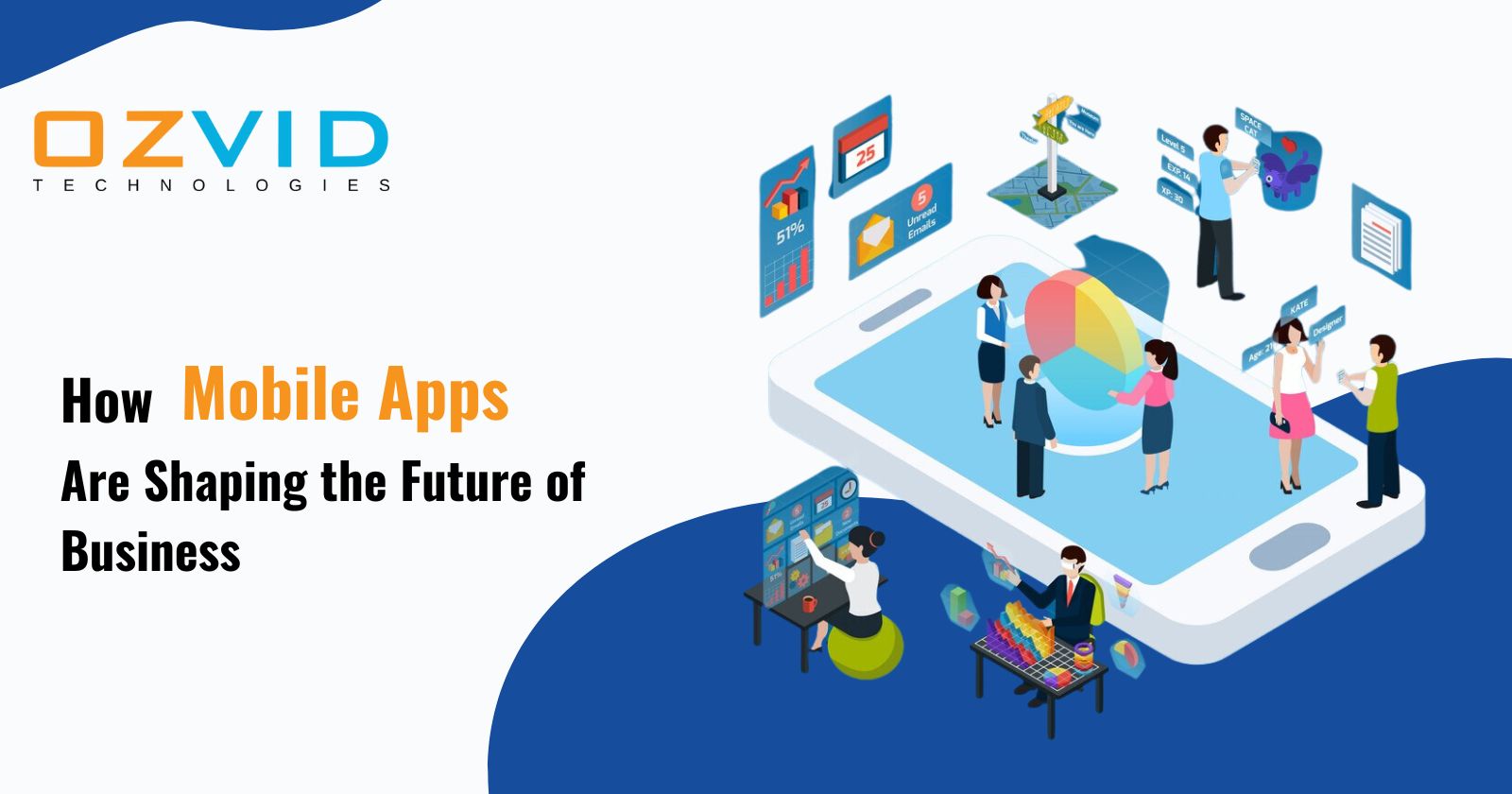- Feb 18, 2025
Share this post on:

In the past decade, mobile technology has undergone a remarkable transformation. What once began as a means of communication has evolved into a powerful business tool, revolutionizing every aspect of how companies operate, interact with customers, and deliver value. Today, mobile apps are integral to nearly every industry, offering companies an unprecedented opportunity to improve efficiency, boost customer engagement, streamline operations, and tap into new revenue streams.
The impact of mobile apps on business has been far-reaching, enabling organizations to adapt to an increasingly mobile-first world. In this blog, we will explore how mobile apps are shaping the future of business by enhancing customer experiences, improving operational efficiencies, enabling new business models, and providing powerful analytics for data-driven decisions. Additionally, we’ll discuss the role of companies like OZVID Technologies in leveraging mobile app solutions to foster innovation and growth in businesses across industries.
The Mobile App Revolution in Business
The proliferation of smartphones and mobile devices, combined with the evolution of mobile networks and app development platforms, has created a robust ecosystem for businesses to thrive in a mobile-first world. Mobile apps have become essential to the way businesses operate and engage with customers. From retail to healthcare, finance to education, mobile applications have disrupted traditional business models and enabled companies to innovate and scale in ways that were previously unimaginable.
As of today, there are more than 6 billion smartphone users worldwide, and mobile apps account for the majority of time spent on these devices. This presents an immense opportunity for businesses to reach consumers, engage them in meaningful ways, and foster long-term loyalty. With consumers demanding convenience, speed, and personalized experiences, businesses that fail to leverage mobile apps risk falling behind in an increasingly competitive marketplace.
Key Areas Where Mobile Apps Are Shaping the Future of Business
1. Enhancing Customer Engagement
One of the most significant ways mobile apps are reshaping business is by transforming customer engagement. Consumers today expect instant access to products, services, and information at their fingertips. Mobile apps allow businesses to meet these expectations by providing customers with easy access to their offerings anytime, anywhere.
Through mobile apps, businesses can engage customers in real-time, offering personalized content, tailored recommendations, and timely notifications. Whether it’s an e-commerce company sending push notifications about a sale, a bank alerting customers about a low balance, or a fitness app reminding users to complete their daily workout, mobile apps enable businesses to stay top-of-mind and provide customers with relevant, timely, and useful information.
Furthermore, mobile apps foster two-way communication, enabling businesses to gather valuable feedback directly from their customers. In-app messaging, surveys, and reviews allow businesses to better understand customer preferences, pain points, and expectations. This feedback loop is crucial for making data-driven decisions and continuously improving products, services, and the overall customer experience.
2. Improving Operational Efficiency
Mobile apps are not just tools for engaging customers; they also play a crucial role in improving internal business operations. Mobile applications allow businesses to streamline workflows, automate processes, and increase productivity across various departments, from human resources to logistics.
For example, mobile apps can simplify the onboarding process for new employees by providing them with easy access to training materials, company policies, and important documentation. Sales teams can use mobile apps to track leads, update customer records, and manage their schedules on the go. Operations teams can monitor inventory, track shipments, and manage supply chains from their mobile devices, reducing the need for manual data entry and improving overall efficiency.
Additionally, mobile apps enable businesses to implement real-time data collection, allowing managers and team members to make informed decisions based on up-to-date information. This real-time visibility into operations helps businesses optimize processes, reduce errors, and respond quickly to changing circumstances, all of which contribute to greater efficiency and cost savings.
3. Enabling New Business Models
Mobile apps have opened the door to new business models and opportunities. By offering a mobile-first approach to service delivery, businesses can reach a broader audience and tap into previously underserved markets. Apps have become essential tools for businesses exploring subscription-based models, on-demand services, and platform-based marketplaces.
For example, mobile apps have been at the heart of the gig economy, where companies like Uber, Lyft, and DoorDash connect service providers with consumers in real time. These platforms rely on mobile apps to facilitate the booking process, manage payments, and track service delivery. Similarly, businesses in the entertainment industry, like Netflix and Spotify, have successfully adopted subscription-based models that rely on mobile apps for seamless content delivery and customer engagement.
Another example of a business model enabled by mobile apps is e-commerce. Mobile shopping has become the norm, with consumers using their smartphones to browse, purchase, and review products from a wide range of retailers. This shift has led to the rise of mobile-first e-chttps://ozvid.com/contact-usommerce platforms like Shopify, which allow businesses to set up online stores and manage transactions through mobile apps. The growing popularity of in-app purchases and mobile wallets, such as Apple Pay and Google Wallet, has further accelerated this trend, making mobile shopping faster, safer, and more convenient for consumers.
4. Personalizing the Customer Experience
Personalization is a key driver of customer satisfaction, and mobile apps are enabling businesses to provide highly personalized experiences that cater to individual preferences and needs. By collecting and analyzing user data, mobile apps can tailor content, offers, and services based on user behavior, location, and other factors.
For instance, e-commerce apps can recommend products based on previous purchases or browsing history, while streaming platforms can suggest content based on a user’s watch history or preferences. In-app promotions and offers can be personalized to reflect a customer’s purchase history or loyalty status, making marketing campaigns more relevant and effective.
Geolocation capabilities also allow businesses to send personalized push notifications based on a user’s location. A retail store can send a discount offer to a customer when they are nearby, or a restaurant can send a reminder about a special promotion when a customer is in the area. This level of personalization improves the overall customer experience and helps businesses build stronger relationships with their users.
5. Expanding Market Reach
Mobile apps provide businesses with the opportunity to reach a global audience. With smartphones being used across all demographics and regions, businesses can expand their reach beyond traditional brick-and-mortar locations and connect with customers around the world.
Mobile apps help businesses tap into international markets, breaking down geographic barriers and providing access to new revenue streams. By offering localized content, language support, and region-specific features, businesses can cater to diverse customer bases and provide relevant experiences for users in different countries.
For example, mobile payment apps like PayPal, Alipay, and Venmo have made it easier for businesses to accept payments from customers across borders. Similarly, global e-commerce platforms like Amazon and Alibaba rely on mobile apps to facilitate transactions, track shipments, and manage customer interactions across multiple regions.
6. Data-Driven Insights for Decision Making
The data collected through mobile apps is an invaluable resource for businesses. Mobile apps provide rich data about user behavior, preferences, and interactions, which can be used to make informed business decisions. This data can include everything from app usage patterns and transaction history to customer feedback and in-app activity.
By analyzing this data, businesses can gain deeper insights into customer needs, identify emerging trends, and predict future behavior. These insights can be used to optimize marketing strategies, improve product offerings, and refine customer service processes. For instance, if an e-commerce app notices that customers frequently abandon their shopping carts at a particular stage of the checkout process, the business can investigate the issue and make improvements to reduce cart abandonment rates.
Furthermore, businesses can use this data to create more effective loyalty programs, improve customer retention, and enhance overall business performance. Mobile apps also enable real-time data collection, allowing businesses to monitor key performance indicators (KPIs) and adjust strategies quickly in response to changing market conditions.
7. Enhancing Customer Support
Mobile apps are increasingly being used to improve customer support and service delivery. In-app support features, such as live chat, AI-powered chatbots, and knowledge bases, provide customers with immediate access to assistance, reducing wait times and improving satisfaction.
By offering self-service options through mobile apps, businesses can empower customers to find answers to their questions, troubleshoot issues, and complete tasks without having to contact support agents. For example, mobile apps for banking or telecom services often include features that allow users to check their account balance, track transactions, and manage settings without the need for direct assistance.
For more complex issues, AI-powered chatbots can assist customers in finding solutions, escalating issues to human agents when necessary. This automation helps reduce the burden on customer support teams, allowing them to focus on more complex cases and improving the overall efficiency of customer service operations.
8. Strengthening Brand Loyalty
Mobile apps have proven to be powerful tools for building brand loyalty. Through features like loyalty programs, personalized offers, and gamification, businesses can incentivize repeat purchases and encourage customers to engage with their brand more frequently.
Loyalty programs integrated into mobile apps allow customers to accumulate points, redeem rewards, and receive exclusive offers. This can create a sense of belonging and reward customers for their continued support. For example, Starbucks’ mobile app offers a rewards program that allows users to earn stars with every purchase, which can be redeemed for free drinks and other perks.
Gamification elements, such as challenges, leaderboards, and badges, can also enhance customer engagement and encourage brand loyalty. By making interactions with the app more fun and rewarding, businesses can create a stronger emotional connection with their customers, ultimately driving long-term loyalty.
Conclusion: Pioneering Mobile App Solutions for the Future of Business
Mobile apps are undoubtedly shaping the future of business in profound ways. From enhancing customer engagement and improving operational efficiency to enabling new business models and providing valuable data-driven insights, mobile apps are becoming an essential tool for businesses looking to innovate and succeed in a mobile-first world. The growing reliance on mobile technology presents an immense opportunity for companies to transform their operations, deliver exceptional customer experiences, and gain a competitive edge in the marketplace.
OZVID Technologies is at the forefront of helping businesses harness the power of mobile apps to drive innovation and growth. With its expertise in mobile app development,OZVID Technologies helps companies across industries design, develop, and implement mobile app solutions that meet their unique business needs.
Whether it’s creating custom apps for enhancing customer engagement, improving operational efficiency, or launching new business models, we work closely with clients to deliver cutting-edge solutions that leverage the latest mobile technologies. With a focus on user experience, data security, and scalability, OZVID Technologies is committed to empowering businesses to thrive in the mobile-first world.
By partnering with OZVID Technologies, businesses can unlock the full potential of mobile apps and stay ahead of the curve in a rapidly evolving digital landscape. Conatct us to learn more.










